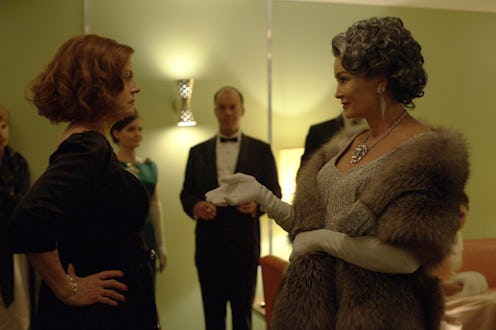
Confusion took over the 2017 Academy Awards ceremony when Faye Dunaway and Warren Beatty were given the wrong envelope and accidentally announced La La Land as the recipient of Moonlight's award. I don't need to be able to see into the future to know that this year's won't have been the last Oscars with controversy, and it definitely wasn't the first. In the year of Whatever Happened To Baby Jane's eligibility, Joan Crawford and Bette Davis carried their ongoing feud into awards season. Davis was nominated for Best Actress for her performance as the demented former child star, but Crawford was snubbed by the Academy for playing Jane's traumatized sister, Blanche. In the April 2 episode of Feud: Bette & Joan, Crawford is driven by spite and jealousy to try to prevent Davis winning the award. But did Joan Crawford really campaign against Bette Davis' Oscar chances?
According to Bette Davis, Joan Crawford allegedly used whatever clout and friendship she had left in Hollywood to allegedly lobby against Davis winning the Academy Award that year. She leveled those allegations against her co-star in her 1987 memoir, This 'N That. (Per Turner Classic Movies.) Davis claimed:
Joan did everything she could possibly think of to keep me from winning. She campaigned openly in New York, contacting all the Oscar nominees who were in plays in New York that year. She offered to accept their Oscars if they won and were unable to attend the ceremony. She also contacted all the members of the Academy who lived in New York, requesting that they vote for one of the nominees then on Broadway. Leaving aside the fact that I felt I deserved to win, the rule of thumb was that an Oscar winner usually added at least a million dollars to the box office receipts of a film. Since Joan and I each had a percentage of the movie, how Medean, how foolish she was to work against my winning.
It is true that Crawford offered to accept awards on behalf of the nominated actresses who were too busy on Broadway to attend the Los Angeles ceremony. The proof there is that one of them actually won. Anne Bancroft's performance in The Miracle Worker earned more votes than Davis' in Baby Jane. Since Bancroft was working in New York City on a production of Mother Courage & Her Children, Crawford stepped in to claim the statue and give Bancroft's brief acceptance speech. Davis was sitting in the auditorium, watching as her nemesis's scheme to somehow hold an Oscar that evening actually worked. By her own account, she was furious, and took Crawford's actions quite personally. "Moments later, Crawford floated down the hall, past my door. I will never forget the look she gave me," Davis wrote in her book, according to The New York Post. "The look clearly said, 'You didn’t win, and I am elated!'"
Crawford denied actively working against Davis in the lead-up to the 1963 Oscars. "I never campaigned against Miss Davis," she told Shaun Considine, the author of Bette & Joan: The Divine Feud. "The Oscar went to Anne Bancroft because she deserved it."
So the truth of the 1963 Oscar Best Actress campaign — like so many aspects of their relationship — comes down to a question of credibility: it's Bette Davis' word against Joan Crawford's.